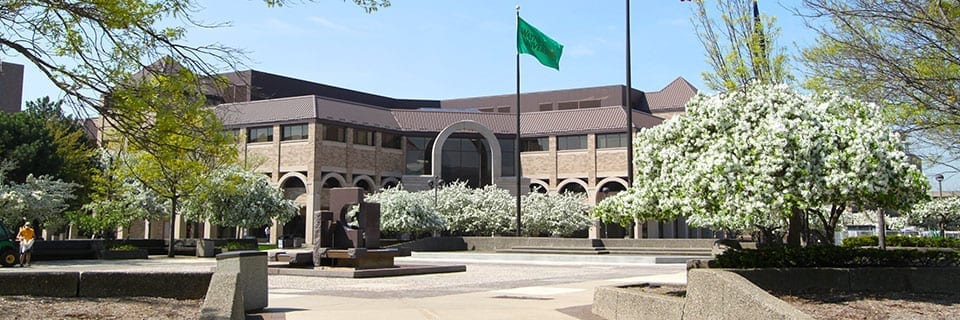Southern Baptist leaders commended the latest court victory for a student faith group that was removed from a state university campus for requiring its leaders to be Christians.
The Eighth Circuit Court of Appeals ruled July 16 that the University of Iowa violated the First Amendment of the U.S. Constitution in exercising “viewpoint discrimination” against the InterVarsity Christian Fellowship chapter on its campus. The university action in deregistering InterVarsity was “clearly unconstitutional,” a three-judge panel of the St. Louis-based appeals court said in a unanimous decision.
The opinion marked the third time in the last four months a court has ruled in favor of a student ministry that had been kicked off campus.
On March 22, the Eighth Circuit Court ruled administrators at the University of Iowa were personally liable for violating the free speech and expressive-association rights of Business Leaders in Christ. A federal judge in Michigan decided in an April 5 opinion Wayne State University in Detroit violated the First Amendment rights of an InterVarsity chapter by revoking its status as a religious student organization.
“This decision sends a clear message to other university, college and high school administrators that a public institution must remain a place where students learn and share ideas independent from a leader’s preference,” said Chelsea Sobolik, acting director of public policy for the Ethics & Religious Liberty Commission, in written comments. “Students’ First Amendment rights, particularly those in religious groups, must be protected while attending public universities and, thankfully, this decision does that.”
Paul Worcester, national collegiate evangelism director for the North American Mission Board, called the ruling “great news” that “should be reassuring to the thousands of Christian student groups that meet on campuses throughout North America.”
“College campuses have traditionally been places of free expression where ideas can be discussed and debated,” Worcester said in written remarks. “This ruling affirms that Christianity and the claims of Christ are still welcomed – and protected – as part of those discussions.”
The Eighth Circuit’s July 16 opinion is the latest in the clash between the rights of campus religious groups to limit leadership to those students who affirm their beliefs and the anti-discrimination policies of universities. In recent years, other schools – such as Vanderbilt University and California State University – have removed religious groups from official recognition because of their faith-based requirements for leaders.
InterVarsity, which has chapters on more than 770 campuses in the United States, has been at the University of Iowa for more than 25 years. The evangelical ministry welcomes all students as members but limits its leaders to those who affirm its statement of faith. The school notified InterVarsity in 2018 that its constitution violated the school’s Human Rights Policy by mandating its leaders be Christians. Shortly thereafter, the school removed the ministry as a registered student organization (RSO).
The university also derecognized 38 other student groups – including other Christian ministries, the Sikh Awareness Club, the Imam Mahdi Organization and the Latter-day Saint Student Association – at about the same time it eliminated InterVarsity as an RSO, according to Becket, the religious liberty organization representing InterVarsity. Meanwhile, the school continued to recognize fraternities, sororities and other groups that base their membership on sex, ethnicity, military experience and some religious beliefs, according to the appeals court’s opinion.
For instance, LoveWorks, which was founded by a student who was denied a leadership position in a Christian ministry, mandates both members and leaders must sign a “gay-affirming statement of Christian faith,’” judge Jonathan Kobes said in the appeals court panel’s decision. “Despite that requirement – which violates the Human Rights Policy just as much as InterVarsity’s – the University did nothing.”
In a 17-page opinion, Kobes said the panel is “hard-pressed to find a clearer example of viewpoint discrimination. The University’s choice to selectively apply the Human Rights Policy against InterVarsity suggests a preference for certain viewpoints – like those of LoveWorks – over InterVarsity’s.”
The university “targeted religious groups for differential treatment under the Human Rights Policy – while carving out exemptions and ignoring other [differing] groups with missions they presumably supported,” Kobes wrote. “The University and individual defendants turned a blind eye to decades of First Amendment jurisprudence or they proceeded full speed ahead knowing they were violating the law.”
In a written release, Daniel Blomberg, senior counsel for Becket, said University of Iowa officials “punished opinions they didn’t like and promoted ones they did – all while using taxpayer dollars to do it. The good news is that they’ve been held accountable, and school officials nationwide are on notice.”
The Eighth Circuit panel’s opinion affirmed a ruling by federal judge Stephanie Rose that found the university violated InterVarsity’s speech, association and free exercise of religion rights.
(EDITOR’S NOTE – Tom Strode is Washington bureau chief for Baptist Press.)

